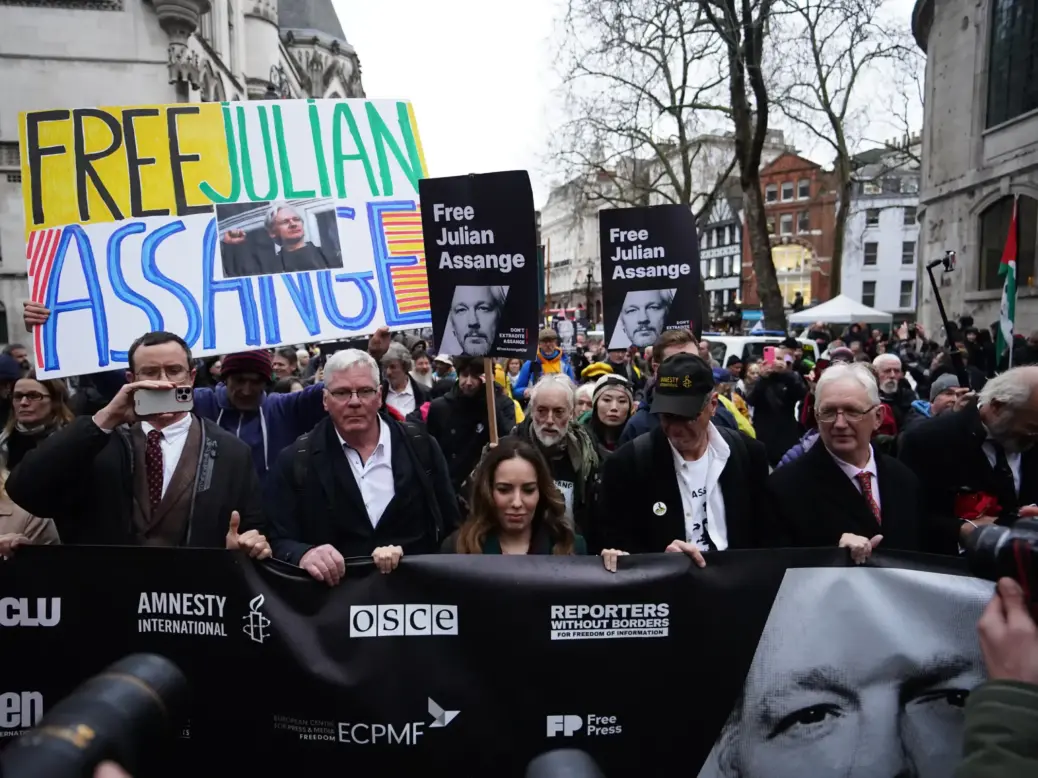
Julian Assange must wait to find out whether his final UK bid to bring an appeal over his extradition to the United States can go ahead at the High Court.
The Wikileaks founder faces extradition to the US over an alleged conspiracy to obtain and disclose national defence information following the publication of hundreds of thousands of leaked documents relating to the Afghanistan and Iraq wars.
In a January 2021 ruling, then-district judge Vanessa Baraitser said Assange should not be sent to the US, citing a real and “oppressive” risk of suicide, while ruling against him on all other issues.
But later that year, US authorities won their High Court bid to overturn this block, paving the way towards Assange’s extradition.
During a two-day hearing in London, lawyers for the 52-year-old asked for the go-ahead to challenge the original judge’s dismissal of other parts of his case to prevent his extradition.
At the end of Wednesday’s hearing, Dame Victoria Sharp and Mr Justice Johnson said they would give their decision at a later date.
At the start of Assange’s bid for an appeal on Tuesday, Mark Summers KC argued the US prosecution of Assange would be retribution for his political opinions, meaning it would be unlawful to extradite him under UK law.
He said: “This is a paradigm example of state retaliation for the expression of political opinion.”
But Clair Dobbin KC, for the US, said on Wednesday that the plans to extradite and prosecute Assange are based on his alleged actions, not his political opinions.
She told the High Court in London that Assange faces allegations he encouraged and assisted Chelsea Manning in obtaining classified documents, including around 400,000 Iraq war-related activity reports and 250,000 US State Department cables, before publishing many of them through Wikileaks.
Dobbin said there were “profound consequences”, with some of the named sources in the documents, who had provided information to the US, facing arrest, the loss of assets, threats and harassment.
“This wasn’t a slip, or an error, this was the publication of a vast amount of material unredacted,” she said.
In written submissions, Dobbin and James Lewis KC described the leak as “one of the largest compromises of classified information in the history of the United States”.
They continued: “It is specifically alleged against the appellant that by publishing this information on the WikiLeaks website, he created a grave and imminent risk that the human sources named therein would suffer serious physical harm.”
The US authorities have denied that the decision to extradite or prosecute Assange is due to his political opinions.
Dobbin said: “The administration in the US of course changed during these proceedings… but nonetheless the prosecution of the appellant remains in foot.
“Because it is based on law and evidence, not political inspiration.”
The barrister later said that the original judge “rejected outright” that Assange should be treated like a journalist “or what he did could fall under the ambit of responsible journalism”.
‘Cause for both hope and concern’ from latest Julian Assange hearing
The two-day hearing at the Royal Courts of Justice has been attended by dozens of journalists and members of the public, with hundreds observing remotely.
Scores of Assange supporters demonstrated outside the central London courthouse over both days, waving banners and inviting passing drivers to honk their horns.
Assange’s wife Stella led a demonstration to Downing Street after the hearing ended on Wednesday. She told supporters that “everything turns on the outcome of this case – whether states can criminalise journalism and put journalists in prison” and described it as an “attack on the truth, an attack on the public’s right to know”.
She also praised “how much attention the media has given this case this time round”.
Tim Dawson, deputy general secretary of the International Federation of Journalists, said the hearing “provided cause for both hope and concern”.
Dawson, who was observing proceedings, pointed to several interventions and questions from Mr Justice Johnson, one of two judges sitting, alongside Dame Victoria Sharp.
Mr Justice Johnson pointed out that Assange “was not the first to publish this material and the others have not been prosecuted”.
Referring to a rival leaks platform that published the diplomatic cables unredacted, Dobbin said in response: “Cryptome couldn’t have published if Assange had not first obtained the leak.”
Dobbin later made the case that Assange’s free speech would be protected by the First Amendment of the US Constitution but Mr Justice Johnson asked: “Do we have any evidence that a foreign national is entitled to the same First Amendment rights as a US citizen?” Dobbin responded that she did not think there was.
Dawson of the IFJ said of these and other interventions: “How much one should read into Judge Johnson’s inquiries is hard to know – but they suggest, if nothing else, that he is approaching the case with an open mind.” He added that “much the best solution” would be for the US to agree some kind of plea deal.
Email pged@pressgazette.co.uk to point out mistakes, provide story tips or send in a letter for publication on our "Letters Page" blog
